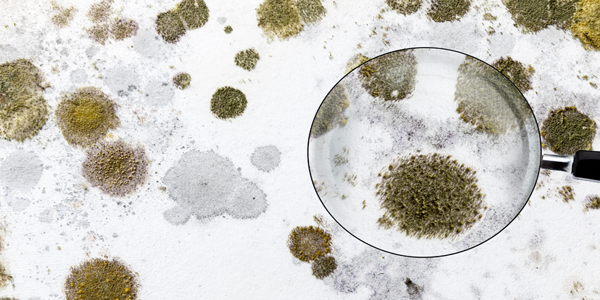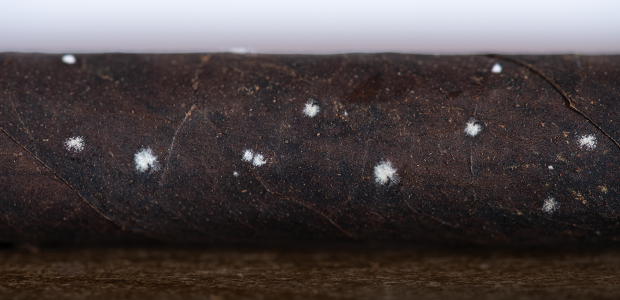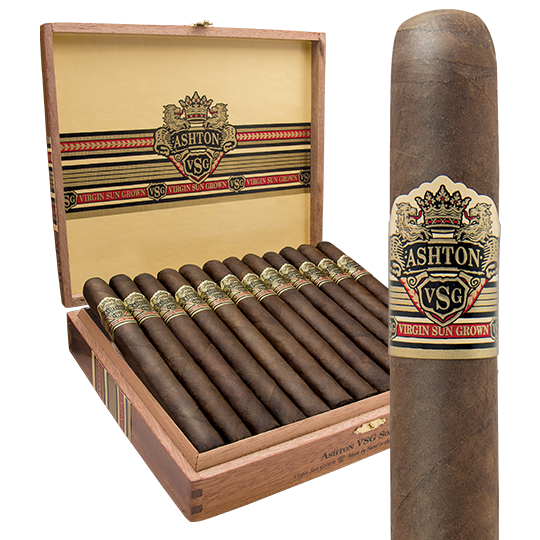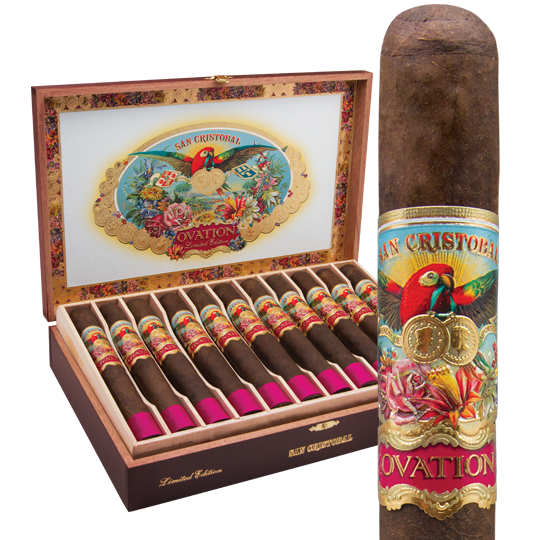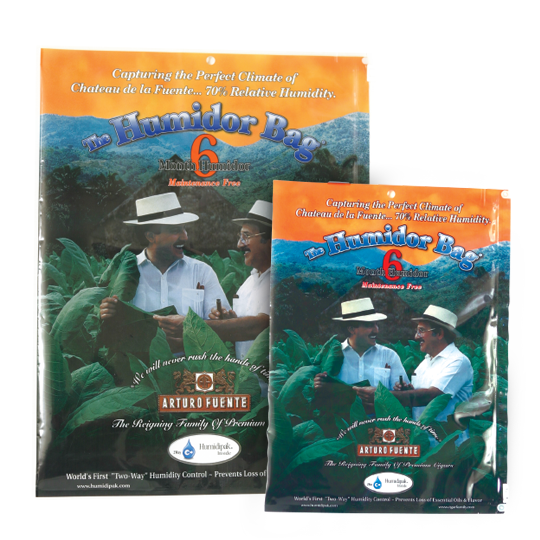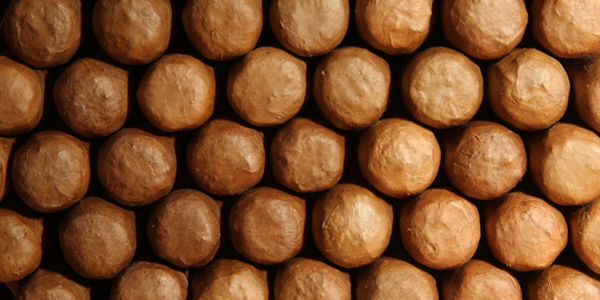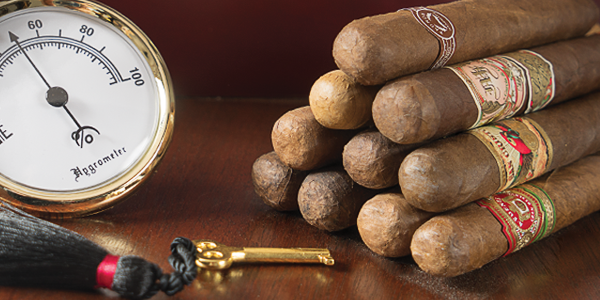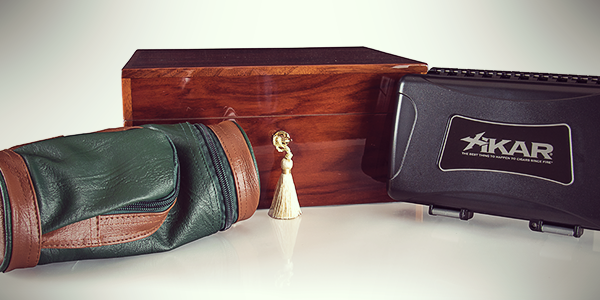Cigar Plume vs. Cigar Mold: What's the Difference?
Okay, so you’ve graduated from picking up one or two cigars on rare occasions to storing a collection of smokes in your own humidor. That’s great news! Now you can bulk up on some of your favorite brands or even better: grab a box or two when they’re on sale. If you’re like me, getting the cigars you want at a deep discount is a temptation hard to resist, even though you might not smoke them all for a while.
As the weeks and months go by while your collection grows, your cigars will age which often lends a tremendous smoothness to the taste. You may notice small white (or light-gray) specs develop on the surface of some of your cigars over time. This is called plume (also referred to as cigar bloom, or tobacco bloom). Plume is harmless and can be easily brushed off your cigars. Plume is actually a positive sign that your cigars are aging in optimal conditions and that your humidor is functioning correctly.
What is Cigar Plume?
Plume results when the oils within the cigar rise to the surface and crystallize. Cigars handcrafted from oilier tobaccos, like an Ashton VSG or a San Cristobal Ovation, may be more likely to develop plume. You may even notice the presence of plume on cigars that you’ve purchased online or in the humidor of your local retailer. Generally speaking, when given the choice between two identical cigars – one with plume and one without – I’ll always take the one with plume. Gently brush the white specs off the wrapper leaf, fire it up, and enjoy the highly refined, premium flavors only an aged cigar can reveal. While plume is a welcome, tangible indication that you’re doing a great job caring for your cigars, mold is exactly the opposite.
What is Mold?
Mold is a most undesirable, alarming condition in any humidor. Mold is very distinct from plume, both in appearance, texture, and often smell. Mold is a blue or bluish-green substance (just like you’d encounter growing on items in your refrigerator that have surpassed an expiration date). Although cigars don’t expire, they are still susceptible to mold. Mold can exhibit a velvety or fuzzy, moss-like texture and can also emit a musty odor. Mold can establish roots and infect the interior of a cigar as much as the surface. Mold occurs due to handful of different factors.
What Causes Mold?
Mold is often the result of continually over-humidifying your cigars, or using non-distilled water in your humidification unit. Remember, 70% RH (relative humidity) is ideal for keeping your cigars fresh. Humidity levels between 62% and 72% are acceptable. It’s not uncommon for cigar enthusiasts to mistake “sponginess,” or softness, for freshness. As a result, some cigar lovers are tempted to store their cigars closer to 75% RH, or even higher. Overly spongy cigars are not fresher. They are over-humidified. A humidor, or cigar collection that is too wet encourages the growth of mold. While mold, like plume, does not develop overnight, you will certainly be headed for an unpleasant scenario if you keep the moisture level in your humidor at an elevated state.
Only Use Distilled Water in Your Humidor
It’s also critical that you use only distilled water to prevent the growth of mold in your humidor. Tap water, or even bottled water from a fancy brand, is not distilled and greatly increases the likelihood for mold to grow. Just pick up a gallon or two of distilled water and keep it in the house for refilling your humidification unit when it’s time.
Once mold occurs, you’re lucky if you can catch it early. Any cigars that bear evidence of mold must be immediately removed from your humidor and disposed of. Mold cannot be eradicated from a cigar that’s been infected with it, although you can sometimes remove its presence from a humidor (in the event that mold is growing inside the box).
Throw Out Any Moldy Cigars
Remove any and all moldy cigars and toss them out. Although some types of mold are harmless, others are toxic and none will make your cigars taste better. If you have more cigars in your humidor that appear to be okay, it’s best to remove those as well and place them in a humidity bag for a period of time while you monitor the humidor to make sure mold is not growing in the box itself.
Replace Your Humidification Unit
You will also likely have to throw out your humidification unit and replace it with a new one. Even in the event that your humidification unit appears to be okay, it may be best to replace it and start with a new one before you refill your humidor with a new batch of expensive cigars. It’s always better to be safe than sorry, especially a second time.
In the worst-case scenarios, you may not only have to part with most, if not all, of your precious cigars, but you may also have to replace your humidor as well. In certain situations you can expunge mold from a humidor, but it requires much patience and you will have to monitor the humidor, with no cigars inside, for a period of time after it has been re-humidified, to ensure that the mold will not return.
Buy Your Cigars from a Reputable Retailer
Be mindful of where you purchase your cigars. Ninety-nine percent of the time, when you’re buying cigars from a trusted retailer, mold will never be an issue with your cigars at the time of purchase. However, if you’re getting cigars from an unknown or less-reputable source, you’re taking a gamble. You don’t know if the cigars were previously exposed to a moldy environment or if they will transfer mold into your humidor and infect your entire collection.
Mold can be a more common issue with Cuban cigars – not because Cuban cigars themselves are more susceptible to mold – but because a number of consumers will buy “Cuban” cigars from street vendors or other less reliable sources when they’re on vacation, for example. If these cigars have been stored inappropriately, they can easily transfer mold into your personal humidor when you bring them home.
When You’re Unsure Whether It’s Mold or Plume
When in doubt, it can never hurt to store your cigars in a temporary environment like an Arturo Fuente Humidor Bag. Your cigars will stay fresh for several months. This will give you plenty of time to evaluate any cigars in question, while they are in a sequestered environment and unable to cause any damage to your humidor or the rest of your collection. Mold will grow, become musty, and render your cigars unsmokable, while plume is a gentle coating of a white, crystallized substance that often forms in tiny specs or dots. Plume is harmless, easily brushed off your cigars, and is a sign of good things to come.

